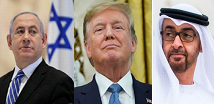Its deal with Israel is indicative of a quiet, yet savvy foreign policy.
How Israel and the Arab World Are Making Peace Without a Peace Deal ←click here 
Abu Dhabi, Aug.29.– It was not quite Anwar Sadat speaking before the Knesset, or King Hussein and Yitzhak Rabin clutching hands in the Rose Garden. That would not have been Muhammad bin Zayed’s style. The agreement between Israel and the United Arab Emirates (UAE), announced on August 13th, was hashed out quietly by spies and sheikhs and unveiled largely on Twitter. It made the uae the first Gulf country and only the third Arab state to open formal relations with Israel. Yet it had all the pomp and circumstance of a tariff agreement.
Though long overshadowed by Saudi Arabia, Prince Muhammad, the uae’s de facto ruler (pictured in illustration), has turned his small country of 10m people into arguably the most influential Arab state. It wields soft power through Dubai, the region’s business hub, and firms like dp World, a shipping giant. A compact but capable army provides a sharper edge. Emirati money and media have backed coups and intrigue across the Middle East.
Much of this is done quietly, allowing the uae to evade the scrutiny applied to bigger powers. Savvy at playing politics in Washington, Paris and other capitals, it positions itself as a reliable partner. “We realise our size,” says one Emirati official. “We need to be part of collective policies.” Westerners who advise the government in Abu Dhabi, often ex-diplomats or retired soldiers, slip into the first-person plural, as if there is no daylight between their employer and their native countries.
Yet the UAE is increasingly willing to go its own way. Its priorities differ from some of its neighbours’: more pragmatic towards Iran and more hostile towards political Islam ...
[ Full text ]
Comments powered by CComment